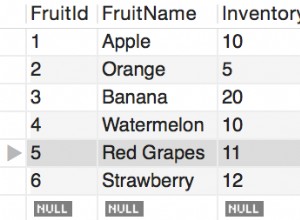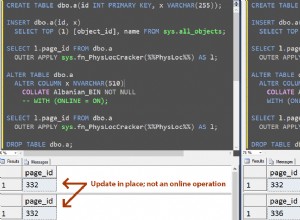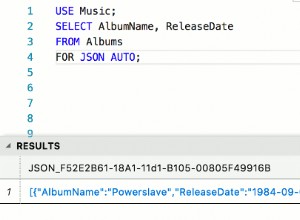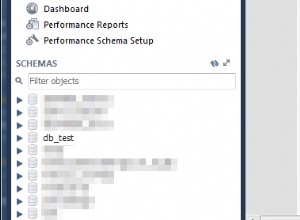Se entendi bem, você precisa de uma maneira de gerenciar adequadamente a sequência de valores na
position coluna ao inserir novas perguntas, alterar a posição de uma existente ou excluir perguntas. Digamos que você tenha o seguinte DDL da sua tabela de perguntas:
CREATE TABLE `questions` (
`id` int(11) UNSIGNED NOT NULL AUTO_INCREMENT,
`question` VARCHAR(256) DEFAULT NULL,
`position` INT(11) DEFAULT NULL,
PRIMARY KEY (`id`)
);
e conjunto de dados inicial como este
+----+------------+----------+
| id | question | position |
+----+------------+----------+
| 1 | Question 1 | 1 |
| 2 | Question 2 | 2 |
| 3 | Question 3 | 3 |
+----+------------+----------+
Para obter uma lista ordenada de perguntas você faz óbvio
SELECT *
FROM questions
ORDER BY position;
Para inserir uma nova pergunta no final da lista de perguntas Você faz
INSERT INTO questions (question, position)
SELECT 'New Question', COALESCE(MAX(position), 0) + 1
FROM questions;
Resultado será:
+----+--------------+----------+
| id | question | position |
+----+--------------+----------+
| 1 | Question 1 | 1 |
| 2 | Question 2 | 2 |
| 3 | Question 3 | 3 |
| 4 | New Question | 4 |
+----+--------------+----------+
Para inserir uma nova pergunta em uma posição específica (digamos na posição 3) na lista você faz isso com duas consultas:
UPDATE questions
SET position = position + 1
WHERE position >= 3;
INSERT INTO questions (question, position)
VALUES ('Another Question', 3);
Agora você tem
+----+------------------+----------+
| id | question | position |
+----+------------------+----------+
| 1 | Question 1 | 1 |
| 2 | Question 2 | 2 |
| 5 | Another Question | 3 |
| 3 | Question 3 | 4 |
| 4 | New Question | 5 |
+----+------------------+----------+
Para trocar as posições de duas perguntas (por exemplo, perguntas com IDs 2 e 5) você faz
UPDATE questions AS q1 INNER JOIN
questions AS q2 ON q1.id = 2 AND q2.id = 5
SET q1.position = q2.position,
q2.position = q1.position
Vamos ver o que temos
+----+------------------+----------+
| id | question | position |
+----+------------------+----------+
| 1 | Question 1 | 1 |
| 5 | Another Question | 2 |
| 2 | Question 2 | 3 |
| 3 | Question 3 | 4 |
| 4 | New Question | 5 |
+----+------------------+----------+
Isso é exatamente o que você faz quando o usuário clica nos botões para cima e para baixo, fornecendo os IDs de pergunta corretos.
Agora, se você quiser manter sua sequência de posições sem lacunas ao excluir a pergunta, você pode fazer isso.
Para excluir do final da lista você usa exclusão simples
DELETE FROM questions WHERE id=4;
Resultados
+----+------------------+----------+
| id | question | position |
+----+------------------+----------+
| 1 | Question 1 | 1 |
| 5 | Another Question | 2 |
| 2 | Question 2 | 3 |
| 3 | Question 3 | 4 |
+----+------------------+----------+
Excluindo uma pergunta no meio (ou início) da lista requer mais trabalho. Digamos que queremos excluir a pergunta com id=5
-- Get the current position of question with id=5
SELECT position FROM questions WHERE id=5;
-- Position is 2
-- Now delete the question
DELETE FROM questions WHERE id=5;
-- And update position values
UPDATE questions
SET position = position - 1
WHERE position > 2;
E finalmente temos
+----+--------------+----------+
| id | question | position |
+----+--------------+----------+
| 1 | Question 1 | 1 |
| 2 | Question 2 | 2 |
| 3 | Question 3 | 3 |
+----+--------------+----------+
ATUALIZAÇÃO :Para facilitar nossa vida, podemos envolver tudo em procedimentos armazenados
DELIMITER $$
CREATE PROCEDURE add_question (q VARCHAR(256), p INT)
BEGIN
IF p IS NULL OR p = 0 THEN
INSERT INTO questions (question, position)
SELECT q, COALESCE(MAX(position), 0) + 1
FROM questions;
ELSE
UPDATE questions
SET position = position + 1
WHERE position >= p;
INSERT INTO questions (question, position)
VALUES (q, p);
END IF;
END$$
DELIMITER ;
DELIMITER $$
CREATE PROCEDURE swap_questions (q1 INT, q2 INT)
BEGIN
UPDATE questions AS qs1 INNER JOIN
questions AS qs2 ON qs1.id = q1 AND qs2.id = q2
SET qs1.position = qs2.position,
qs2.position = qs1.position;
END$$
DELIMITER ;
DELIMITER $$
CREATE PROCEDURE delete_question (q INT)
BEGIN
SELECT position INTO @cur_pos FROM questions WHERE id=q;
SELECT MAX(position) INTO @max FROM questions;
DELETE FROM questions WHERE id=q;
IF @cur_pos <> @max THEN
UPDATE questions
SET position = position - 1
WHERE position > @cur_pos;
END IF;
END$$
DELIMITER ;
e use-os assim:
-- Add a question to the end of the list
CALL add_question('How are you today?', 0);
CALL add_question('How are you today?', NULL);
-- Add a question at a specific position
CALL add_question('How do you do today?', 3);
-- Swap questions' positions
CALL swap_questions(1, 7);
-- Delete a question
CALL delete_question(2);




